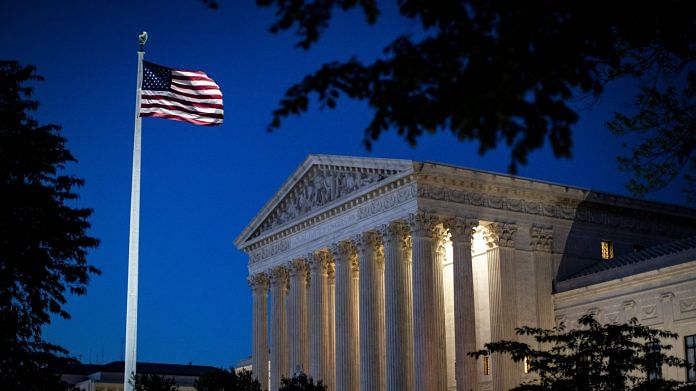Washington: The U.S. Supreme Court rejected the bid by Texas and President Donald Trump to nullify the election results in four pivotal states in an abrupt, effectively unanimous order that could be the legal death-knell for efforts to overturn President-elect Joe Biden’s victory.
The justices refused to let Texas sue to challenge Biden’s wins in Pennsylvania, Georgia, Michigan and Wisconsin. The order clears those states to cast their votes for Biden in the Electoral College on Monday.
“Texas has not demonstrated a judicially cognizable interest in the manner in which another state conducts its elections,” the court said in an unsigned two-paragraph order.
No justice publicly dissented from that conclusion or said he or she would block the states from casting their votes. Trump’s three Supreme Court appointees — Neil Gorsuch, Brett Kavanaugh and Amy Coney Barrett — gave no suggestion they disagreed with the order.
The decision ends a lawsuit hailed by Trump on Twitter as “the big one,” and it dashes his oft-expressed dream of vindication at the Supreme Court, which has a 6-3 conservative majority thanks to Trump’s appointments. Barrett’s nomination was rushed through the Senate confirmation process, with Trump saying her vote would be needed to resolve any election disputes.
Earlier Friday, Trump called on the nation’s top court to show “great Wisdom and Courage.”
If the Supreme Court shows great Wisdom and Courage, the American People will win perhaps the most important case in history, and our Electoral Process will be respected again!
— Donald J. Trump (@realDonaldTrump) December 11, 2020
Justices Clarence Thomas and Samuel Alito said they would have let Texas file the suit, noting that they’ve long maintained the Supreme Court has no choice but to allow a suit by one state against another. They indicated they wouldn’t have blocked the electors from voting, though, saying they “would not grant other relief.”
‘The Big One’
Michael Gwin, a spokesman for the Biden campaign, said in a statement that the court “decisively and speedily rejected the latest of Donald Trump and his allies’ attacks on the democratic process.”
The White House referred reporters to the Trump campaign, which didn’t immediately respond to a request for comment.
Trump has spent months trying to shake the nation’s faith in the integrity of its voting systems, repeatedly forecasting before Nov. 3 that the election would be rigged because of the expanded use of mail-in ballots, and then saying afterward it had been, without ever producing evidence to back up those claims in court.
Dozens of lower courts rejected cases pressed by Trump and his allies. Members of the Trump administration, including Attorney General Bill Barr, have said they haven’t found any instances of widespread fraud.
Texas, with Trump’s support, sought an extraordinary last-minute intervention by the high court. Texas claimed its rights were violated because the four states unconstitutionally expanded mail voting, opening up their elections to fraud and irregularities.
Bush v. Gore
The court’s apparent unanimity created a contrast with the 2000 Bush v. Gore ruling, a 5-4 decision that sealed Republican George W. Bush’s election and stopped recounts that might have swung the pivotal state of Florida to Democrat Al Gore.
More than half of the House Republicans and GOP attorneys from 17 states backed Texas at the Supreme Court. But Republican Senator Ben Sasse of Nebraska praised the decision.
“Every American who cares about the rule of law should take comfort that the Supreme Court — including all three of President Trump’s picks — closed the book on the nonsense,” Sasse said in an emailed statement.
The Supreme Court had already suggested it had little patience for efforts to overturn Biden’s victory. In a one-sentence rebuff on Tuesday, the court rejected a request by Trump allies to nullify Biden’s victory in Pennsylvania. A group led by a Republican congressman argued that the state’s legislature exceeded its power by allowing universal mail-in voting for the first time.
Original Jurisdiction
Texas tried to invoke the court’s so-called original jurisdiction, which lets states sue one another directly at the Supreme Court as if it were a trial court. The four states being sued said the court hears those types of claims only when they implicate core sovereign interests.
The four states said Texas lacks standing to sue in any court because it hasn’t suffered the type of concrete injury that would let it press a case. They also said Texas waited so long to sue — 34 days after the election — that its claims became legally moot.
Although other election challenges remain in the legal pipeline, Texas’s suit was the only one that attempted — in an unprecedented way — to nullify Biden victories in enough states to potentially flip the outcome. Biden’s 306-232 Electoral College advantage means Trump would have to somehow reverse the results in at least three contested states to retain the presidency. –Bloomberg
Also read: Trump’s Israel-Morocco deal is another mess for Biden to clean up



